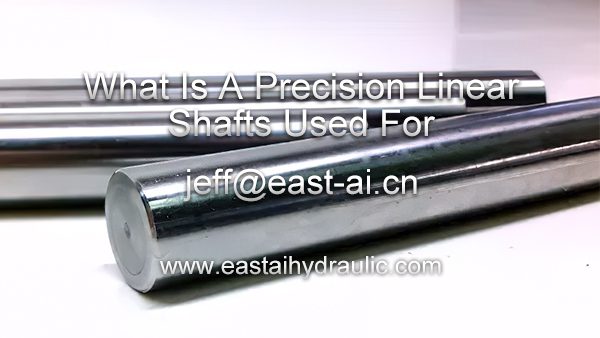What Is A Precision Linear Shafts Used For?
Have you ever marveled at the smooth motion of a machine or wondered what makes a robotic arm move so precisely? The magic behind these wonders often lies in something as unassuming as a precision linear shaft. These shafts are the unsung heroes of the industrial world, enabling everything from factory robots to 3D printers to operate with remarkable accuracy and reliability.
What Are Precision Linear Shafts?
Simply put, precision linear shafts are cylindrical rods engineered with high accuracy to guide or transmit motion in a linear path. Unlike ordinary shafts, these are meticulously crafted to ensure minimal deviation in straightness and smoothness, which is essential for applications that demand exacting precision.
Types of Precision Linear Shafts
There’s a whole world of variety when it comes to these shafts. You’ve got solid shafts, known for their strength and rigidity, and hollow shafts, which are lighter and can offer flexibility in design. Then there are custom-designed shafts tailored for specific industry needs. Each type serves its unique purpose, catering to different engineering challenges.
Solid Shafts
Solid shafts offer the greatest strength and are often used in applications requiring high load capacities.
Hollow Shafts
Hollow shafts provide reduced weight and are ideal for applications where mass reduction is critical.
Custom-Designed Shafts
Custom shafts are specifically engineered to meet the unique requirements of particular projects, offering tailored solutions for challenging applications.
Key Features of Precision Linear Shafts
What sets these shafts apart are their key features: tolerance, straightness, and surface finish. Tolerance refers to the acceptable variation in dimensions, ensuring that the shaft fits perfectly with other components. Straightness is crucial for avoiding any wobble or misalignment during motion, while a fine surface finish reduces friction and wear.
Materials Used in Precision Linear Shafts
Choosing the right material is like picking the right tool for the job. Steel is the go-to choice for its unbeatable strength and durability, especially high-carbon steel. Stainless steel takes the spotlight when corrosion resistance is needed. For lighter applications, aluminum comes into play, offering decent strength without the weight penalty.
Steel
Steel shafts provide high strength and are ideal for demanding environments.
Stainless Steel
Stainless steel is used when corrosion resistance and cleanliness are critical, such as in food processing or medical applications.
Aluminum
Aluminum offers a lightweight alternative with good strength, making it suitable for less demanding applications where weight is a factor.
Applications of Precision Linear Shafts
These shafts are the backbone of countless machines and devices. In CNC machines, they ensure components move precisely as programmed. In automated assembly lines, they guide parts smoothly from one station to the next. You’ll also find them in medical devices, where precise movement is critical, and in robotics, enabling robots to move with finesse.
Manufacturing Process
Creating a precision linear shaft is an art in itself. It starts with selecting the right raw materials. The shaft is then machined to exact dimensions and undergoes a series of finishing processes to achieve the desired smoothness and straightness. Quality control checks are vital at every step to ensure the finished product meets stringent specifications.
Raw Material Selection
The process begins with selecting the highest quality raw materials to ensure durability and performance.
Machining and Finishing
Machining involves cutting the material to precise dimensions, while finishing ensures the surface is smooth and free from defects.
Quality Control
Throughout the manufacturing process, rigorous quality checks are performed to maintain high standards.
Importance of Precision in Shafts
Why all the fuss about precision? Well, in engineering, even the slightest deviation can spell disaster. Precision ensures that parts fit together seamlessly, reducing wear and tear and enhancing the overall performance of the machine. It’s like the difference between a finely tuned instrument and one that’s slightly out of tune.
Comparing Precision Linear and Rotary Shafts
Both linear and rotary shafts are critical components, but they serve different functions. Linear shafts guide motion along a straight path, ideal for applications like slides and guides. On the other hand, rotary shafts enable rotational movement, making them perfect for motors and gears. The choice between the two depends on the desired motion and application.
Selecting the Right Precision Linear Shaft
Choosing the right shaft is akin to finding the right partner – it requires understanding and compatibility. Consider factors such as load capacity, speed requirements, and environmental conditions. Consulting with engineers or utilizing performance data can also guide you in making an informed decision.
Challenges in Precision Shaft Manufacturing
Manufacturing precision shafts isn’t without its hurdles. Maintaining high accuracy and meeting tight tolerances can be challenging. Temperature variations, tool wear, and material inconsistencies are some common issues. However, advances in manufacturing technology and stringent quality control measures help overcome these challenges.
Innovations in Precision Linear Shaft Technology
The world of precision shafts is ever-evolving. Recent innovations include advanced coating technologies that enhance durability and reduce friction. Smart shafts with embedded sensors can provide real-time data on performance and wear, opening up new possibilities for predictive maintenance and improved efficiency.
Maintenance and Care
Just like any high-performance tool, precision shafts need regular maintenance to keep them in top shape. Regular inspections, proper lubrication, and cleaning can significantly extend their lifespan and ensure they operate smoothly. Think of it as giving your car a regular tune-up to keep it running smoothly.
Future Trends
Looking ahead, we can expect to see more integration of smart technology in precision shafts, allowing for real-time monitoring and self-adjustment capabilities. Additionally, advances in material science might lead to even more robust and versatile shafts that can handle extreme conditions with ease.
Precision linear shafts are vital components that underpin the smooth operation of countless machines and devices. By understanding their types, features, and applications, we can better appreciate their role in modern engineering and innovation.


